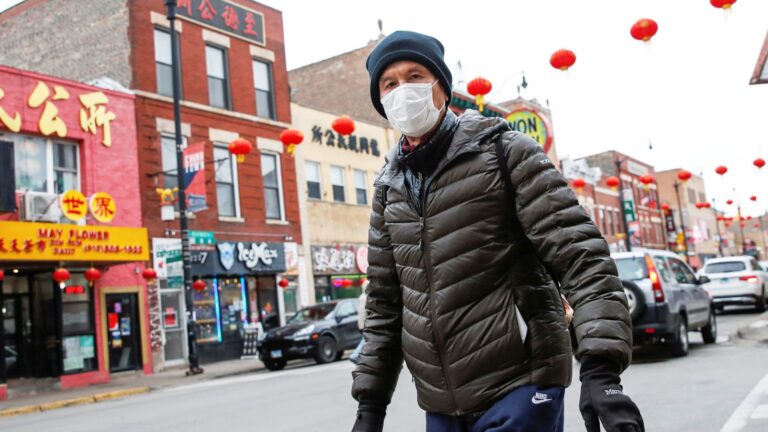
[ad_1]
A man wears a masks in Chinatown following the outbreak of the novel coronavirus, in Chicago, Illinois January 30, 2020.
Kamil Krzaczynski | Reuters
The new strain of coronavirus that has created a deadly epidemic in China is “a lot more contagious” than the flu, a top pharma CEO told CNBC.
Speaking to CNBC’s Julianna Tatelbaum Friday, AstraZeneca CEO Pascal Soriot said the virus, formally named COVID-19, was a highly contagious infection.
“What we have all learned is that the virus leads to a lower mortality than the flu virus, but it’s a lot more contagious, the virus is very contagious,” he said. “I will not say it’s totally controlled yet, but I’m hoping that over the next few months that we will see it get under control.”
At least 19 million people across the U.S. have been infected this flu season, according to data from the Centers for Disease Control and Prevention, which has resulted in 10,000 deaths and 180,000 hospitalizations.
Despite the high contagion rate of COVID-19, Soriot told CNBC he was optimistic that Chinese authorities would be able to contain the virus, noting that “we got past” the outbreak of H1N1 — also known as swine flu — around a decade ago.
“The Chinese government has really swung a lot of resources, a lot of effort at controlling the disease as much as they can in the country, there’s been a lot of work already to control travel, to stop people from spreading the disease,” he explained.
“In the Hubei region Wuhan is really controlled. This effort should have an impact over time and that’s why we believe that we’ll get past this epidemic.”

In its full-year guidance for 2020, AstraZeneca said it had assumed “an unfavourable impact from China lasting up to a few months as a result of the recent novel coronavirus outbreak.”
“Depending on the impact of the COVID-19 epidemic, total revenue is expected to increase by a high single-digit to a low double-digit percentage and core EPS is expected to increase by a mid to high-teens percentage,” the pharma giant said in its earnings report on Friday, noting that it would provide an update with its first-quarter results for this year.
Researchers have already warned that COVID-19 may be more contagious than current data shows.
At the end of January, the WHO estimated that the R naught of the virus was between 1.4 and 2.5. An R naught, or R0, rating of 1 means the average person infected with the virus will spread it to one other person.
An outbreak is expected to continue if a disease is given an R naught value higher than 1 during an event like the epidemic currently occurring in China.
Research published last month estimated the R naught for COVID-19 was around 2.2, meaning each patient will infect at least two people — that would make the coronavirus more infectious than seasonal flu.
Meanwhile, a research team at Lancaster University in England suggested in January that the coronavirus may have an R naught of 3.1, while Chinese scientists said it could be even higher.
“We estimated the mean R0 ranging from 3.30 to 5.47,” they said in a paper published last month.
Race to develop a vaccine
Researchers across the globe are racing to develop a vaccine for the new strain of coronavirus, formally named COVID-19, which has been declared a “grave threat” by the World Health Organization (WHO) and has so far infected over 60,000 people globally.
Several pharmaceutical firms, including Vir Biotechnology, Moderna and Inovio Pharmaceuticals, have suggested they are working on a vaccine for the virus, which was first reported in the Chinese city of Wuhan on December 31.
Despite the global effort to develop a vaccine, medical experts have warned it could take a while for one to be cleared for public use.
The new strain of coronavirus produces mild cold symptoms in about 80% of patients, a WHO official told reporters Monday. Around 15% of those who contracted COVID-19 ended up with pneumonia, while 3% to 5% of all patients needed intensive care, she said.
China’s National Health Commission on Friday reported an additional 121 deaths and 5,090 new cases of COVID-19 across the mainland for February 13.
Authorities in Hubei province, which is at the epicenter of the crisis in China, said Friday that 51,986 people in the region had been infected with the coronavirus so far.
— CNBC’s Berkeley Lovelace Jr. and Jessica Bursztynsky contributed to this article.
[ad_2]